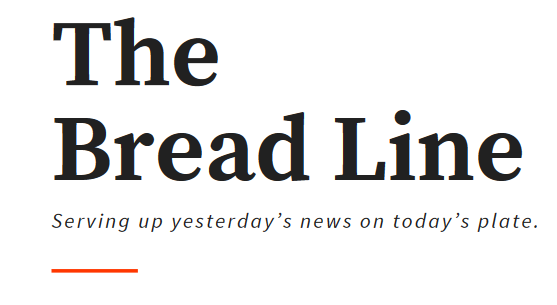
Hey there, friends. Today, we’ve got some coronavirus news just like everyone else on the face of the planet. That, plus some signs that the times, they are a-changin’, or at least we sure can hope.
Tara Reade filed a criminal complaint and The New York Times picks up the story: Tara Reade, who has accused presidential candidate Joe Biden of sexual assault, has filed a criminal complaint with the Washington Metropolitan Police Department. It was only a matter of time before it hit the public consciousness and The New York Times has finally reported on this major story.
American excellency, death cult edition: The U.S. is number one but it’s not a badge of honor—we’ve racked up the most coronavirus deaths in the whole world. So what went wrong?
Oh my God please just bail out the post office: USPS is running out of cash, fast. That really sucks and we shouldn’t let it happen, especially not because Trump has beef with Amazon.
Maybe time doesn’t exist anymore but believe it or not, it’s Monday. Let’s make like Garfield and get through it.
JOE BIDEN
Joe Biden’s Accuser, Tara Reade, Files Formal Complaint

Joe Biden has earned himself a reputation as the folksy ol’ Uncle who sat in the passenger seat of the buddy cop Obama administration. At least, that’s how some people think of him—anyone who has kept up with the Tara Reade story may feel very differently.
Tara Reade, a former Biden staffer, has made the very serious allegation that Joe Biden pushed her against a wall and penetrated her with his fingers nearly 30 years ago in 1993. Recently, Reade filed a criminal complaint with the D.C. police department.
This Is More Symbolic, Than Anything
Of course, with the alleged assault having happened so long ago, the statute of limitations have passed on the claims Reade is making. As Reade noted on Twitter, though, “there is justice in just being heard in a dignified way.” Biden isn’t going to wind up in a cell for this, but having her claims acknowledged by some institutional force can be important and seems to force the conversation into the mainstream, as evidenced by the story being picked up by Business Insider.
As of writing, this story still hasn’t been picked up by CNN, MSNBC, or the Washington Post. Reason, Newsweek, Business Insider, and Vox all have stories about the incident. On Sunday, The New York Times published its story on the accusations.
Reade first spoke up about Biden’s alleged behavior last year, though at the time her allegations were limited to placing his hand on her shoulder or running fingers down her neck. Now, she says, she wants to share her story: Biden pushed her against a wall, digitally penetrated her, and when she moved away, Biden noted that he believed she “liked” him.
Biden’s campaign has denied the allegations.
Will This Story Change Anything?
Normally, you’d think a looming sexual assault claim would have some kind of impact on a presidential election. It sure didn’t seem to impact Trump’s campaign much though and it’s unclear whether or not the story will be picked up by mainstream outlets.
The danger: if the media continues to ignore it, there is the possibility that conservatives will seize upon the opportunity once we’re closer to November. It doesn’t really matter that Trump has his own list of accusations; if it appears that the Democratic establishment willfully ignored what may be credible claims, it won’t play well for Biden.
The opposition: folks who are aware of the story but are shrugging it off, including #MeToo advocate Alyssa Milano, insist that while they generally believe women, some people may end up weaponizing sexual assault claims for political gain. For some, it seems all too convenient that Reade’s allegations are coming out now when Biden is the clear favorite for the Democratic nomination.
The rebuttal: isn’t that kinda the same argument conservatives made in regards to Brett Kavanaugh, though? Why didn’t Christine Blasey Ford just say something earlier? Elevating sexual assaulters to even higher positions of power is something we should take umbrage with. It’s also important to note that the cultural attitudes towards claims like these have changed quite a bit in just the past five years.
As for whether or not Reade has some political stake in this, she says she sought the help of Time’s Up, an anti-sexual harassment and assault organization, in January, when she believed Biden was soon to drop out due to poor early performance. Time’s Up turned down Reade’s request for assistance because they believed it was too close in proximity to campaign activity, as reported by The Intercept.
The credibility: Biden has had other allegations of misconduct in the past, leading him to post a video promising to be “more mindful” in the future back in 2019. Reade was a Biden staffer back in 1993 and two sources close to her say she told them of the incident when it happened. The New York Times piece seems to offer more damning information: two former interns confirm that Reade suddenly stopped supervising them around that time, which matches up with her story, and a third person says Reade told them about the incident. For a more detailed breakdown on the credibility of Reade’s allegations, take a look at this Current Affairs piece.
Bottom line: in 2018, we were rightfully pretty angry about the handling of Brett Kavanaugh’s accusations. If credible, Reade’s accusations deserve just as much attention. It’s still unclear whether or not the story will be picked up by more major media outlets or if it will have any impact in the election.
CORONAVIRUS
We Have the Most Deaths. How Did We Get Here?

Coronavirus. It’s a global pandemic and the U.S. now has over 21,000 deaths as a result. On Friday, the country’s death toll jumped up by more than 2,000 cases—in a single day. What went wrong and how did we get here?
America Can Be Kind of a Death Cult
It’s clear that the American response to the coronavirus has been, well, lacking to say the least. Between governors trying to outbid one another for necessary supplies and a federal administration that sends constant mixed and dangerously confusing messages, it’s hard to pin the fault on just one thing. But what if the problem is more structural than we realize?
To grasp what we did wrong, it might be good to look at what countries handled this well. Vox recently put out an explainer on South Korea’s response. Some of the measures they put in place just may not be applicable to the U.S., though, where tracking people—even with a global health crisis on the plate—seems pretty scary.
There’s also the fact that we’re seeing a constant tug-of-war between state governments and the federal government. For example, some states allowed exemptions to their stay-at-home orders for religious gatherings. Inconsistent messaging is never good during an emergency.
Of course the Trump administration is to blame for quite a bit of this. Between cutting funding from essential health services and impairing our ability to do proper research to downplaying the severity of the pandemic and going so far as to recommend malaria treatments, they’ve played a nasty part in all of those deaths. Still, it’s hard not to place some of the blame on traditional media, whose early reporting also downplayed COVID-19. We can’t forget about Elon Musk saying that the “coronavirus panic is dumb,” either.
We Know We Can’t Rely on Trump—So Why Did We Try?
We certainly don’t want to let Trump off the hook here. His administration’s failures are grave, perhaps even evil, but these are the kinds of mistakes we ought to expect from him. What about everyone else who failed us?
Hong Kong had a government that let them down. That said, they also had a massive societal reaction involving immediate social distancing, wearing masks, and pressuring the government into closures.
The media let us down. Local leaders let us down, too. We should have been watching and learning from the world instead of pretending that it was a problem that would never wash up on our shores.
Bottom line: it’s a complex world we live in, involving intertwining systems that can seem impossible to make sense of. Placing blame is hard when the problem is so involved with every area of our livelihoods. Instead, we ought to look at what we can to start thinking systemically and pressuring whatever leaders we can rely on to get us through this.
FUNDING
Please, Bail the USPS Out

The United States Postal Service is pretty unique in terms of its structure. In its current form, it is a wholly self-funded public sector entity. This gives USPS a monopoly on regular mail services, but it also allows them to do the things a private company wouldn’t (like delivering mail to places where it isn’t profitable). Basically, the USPS rocks but it’s currently being hit pretty bad by coronavirus woes. We should save it. Unfortunately, the White House has rejected a USPS bailout as of Saturday.
You’ve Got Mail…For Now, Anyway
Without federal assistance, Congress has learned, the post office is going to run out of cash sometime in September.
Republicans hate the idea of dropping billions on postage. After all, that’s a core part of their garbage ideology: they’re hostile towards public services and in the case of postage, many of them believe that privatization could be more profitable. Plus, Trump really hates Amazon and the USPS gives Amazon a solid deal on shipping.
Democrats are traditionally fans of the United States Postal Service. This is because it’s a popular government agency with a ton of unionized workers and while it’s not profitable, it’s not that much of a drain considering you offer a huge service to people in rural communities that may otherwise be unable to receive mail. To many Dems, the solution is simple: bail ‘em out!
Leftists have proposed other solutions. Bernie Sanders is notably a champion of allowing the USPS to offer basic banking services at every location. This would, in one fell swoop, boost the revenue of the USPS while also creating a public banking option that could put private banks on the backburner for many Americans.
Corporate Bailouts Suck, But We Should Bail Out Good Government Services
The economy isn’t doing so hot. That kind of instability lays the groundwork for all kinds of dismantling of social norms and institutions. If we allow the USPS to be put at risk, we may end up with a lot of people trying to justify getting rid of it altogether, putting great jobs to bed and leaving us without a government apparatus that we would argue does something the private sector just won’t.
END OF THE LINE...
That’s it for today.

That’s what we’ve got. Remember, we’re only able to do this every day because of readers like you. Drop your friends and family a referral link and help us grow. We’d truly appreciate it.
Have a good one,
The Bread Line



